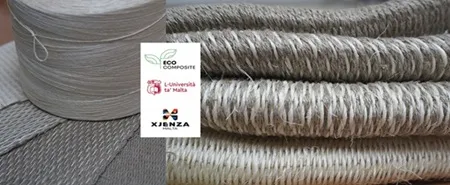-
 Welcome to plumtriA platform for Research & Innovation
Welcome to plumtriA platform for Research & Innovation -
 Looking for Funding?Check out the current open calls
Looking for Funding?Check out the current open calls -
 Register today to start receiving our monthly newsletter
Register today to start receiving our monthly newsletter -
 Looking to partner up?Search our list of registered profiles
Looking to partner up?Search our list of registered profiles -
 You have questions on a particular funding programme?
You have questions on a particular funding programme?
Project ECO-Composite - Ecological Natural Fibre Reinforced Hybrid Composites
Image

The widespread use of synthetic glass and carbon fibres in the composite manufacturing industry offers strength and rigidity but poses environmental challenges. Synthetic fibres and resins are derived from petrochemicals, are difficult to recycle, and may pose environmental or health risks during production. Natural fibres, such as sisal and flax, present a more sustainable alternative, especially when paired with biodegradable resins. Flax derived from the Linseed plant, has strong mechanical properties but is costly to cultivate, while Sisal extracted from the Agave Sisalana plant is cheaper and easier to grow but harder to process. Hybrid composites using both fibres can enhance performance, lower costs, and improving sustainability. The project ECO-Composite developed Hybrid Flax/Sisal bio-based composites and investigates the mechanical, environmental, and processing aspects of such hybrid applications to support greener industrial materials.
ECO-Composite project received funding from Xjenza Malta and the Ministry for Science and Technology of the People’s Republic of China (MOST), through the SINO-MALTA Fund 2022 Call (Science and Technology Cooperation).
Information and image source:
Attachments: External Link

plumtri is a platform that facilitates networking and knowledge sharing amongst stakeholders in the Mediterranean, involved in the spheres of research and innovation and serves as a 'one-stop-shop' for information on relevant funding opportunities and events.
Contact Us
Address:
Xjenza Malta
Villa Bighi,
Dawret Fra Giovanni Bichi,
Kalkara KKR 1320,
Malta.
(+356) 2360 2161



